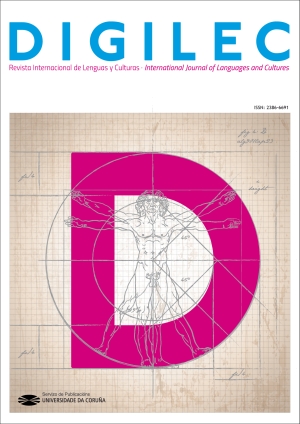A comparative analysis of online English language dictionaries and online Portuguese language dictionaries from the perspective of learning Portuguese as a foreign language
Contenu de l'article principal
Résumé
There are studies that have analysed Portuguese language dictionaries and that have highlighted the importance of the presence of examples in dictionaries (Santiago, 2012; Lu, 2018). Owing to this importance, it was decided to compare the frequencies of examples of two sets of words, namely, contrastive words and verbs that may convey recommendation or advice. These frequencies were obtained from a sample of the main body of Portuguese language dictionaries that are available online and from a sample of the main body of online English language dictionaries that have an orientation towards learning English as a foreign language. This comparison was carried out by using a search bar and a software application created by the author. From the analyses of the data which had been collected, it was argued that, in some cases, learners of Portuguese as a foreign language would have to make use of other sources of examples to learn to use the target words. On the other hand, in similar cases, the need to use sources of examples apart from those presented in the main body of the target English language dictionaries, while learning the English language, could be reduced. The pedagogical implications of this argument for learning and teaching Portuguese as a foreign language were presented. The limitations of the present study and future research possibilities were also discussed.
Mots-clés :
Téléchargements
Détails de l'article
Références
Barbosa, R. A. (2021). Os dicionários eletrónicos e a importância dos seus utilizadores. Master’s thesis. Universidade Nova de Lisboa. Retrieved from: https://run.unl.pt/handle/10362/130844
Biderman, M. T. C. (2003). Dicionários do português: da tradição a contemporaneidade. Alfa: Revista de Linguística, 47(1), 53-69. Retrieved from: https://periodicos.fclar.unesp.br/alfa/article/view/4232
Cobb, T. (1997). From concord to lexicon: Development and test of a corpus-based lexical tutor. Doctoral thesis. Concordia University.
Duran, M. S. (2008). O ensino do uso do dicionário aos aprendizes de língua estrangeira: Quem se importa? Revista do Gel, 5(2), 199-212. Retrieved from: https://revistas.gel.org.br/rg/article/view/123
Finger-Kratochvil, C., & Carvalho, M. G. M. de (2016). O uso do dicionário como estratégia metacognitiva de aquisição lexical na leitura em mídia virtual e impressa. Letrônica, 9(2), 295-309. Retrieved from: https://revistaseletronicas.pucrs.br/ojs/index.php/letronica/article/view/23815
Hartmann, R. R. K. (2005). Pure or hybrid? The development of mixed dictionary genres. Facta Universitatis Series: Linguistics and Literature, 3(2), 193-208. Retrieved from: http://facta.junis.ni.ac.rs/lal/lal2005/lal2005sadrzaj_n.html
Höfling, C., Silva, M. C. P. Da, & Tosqui, P. (2004). O dicionário como material didático na aula. Intercâmbio, 13.
Leffa, V. J. (2006). O dicionário eletrônico na construção do sentido em língua estrangeira. Cadernos de Tradução, 2(18), 319-340. Retrieved from: https://periodicos.ufsc.br/index.php/traducao/article/view/6976
Lewis, M. (1993). The lexical approach: the state of ELT and the way forward. Language Teaching Publications.
Lu, Q. (2018). O uso dos dicionários pelos aprendentes chineses de PLE. Master’s Thesis. Universidade de Lisboa. Retrieved from: http://hdl.handle.net/10451/35584
Nesi, H. (1999). The specification of dictionary reference skills in higher education. In R. R. K. Hartmann (Ed.), Dictionaries in language learning. Recommendations, national reports and thematic reports from the thematic network project in the area of languages, sub-project 9: Dictionaries (pp. 53-67). Freie Universität Berlin.
Podhajecka, M. (2009). Historical Development of Lexicographical Genres: Some Methodological Issues. In R. W. McConchie, Alpo Honkapohja, & Jukka Tyrkkö (Eds.), Selected Proceedings of the 2008 Symposium on New Approaches in English Historical Lexis (HEL-LEX 2) (pp. 153-170). Cascadilla Proceedings. Retrieved from: http://www.lingref.com/cpp/hel-lex/2008/index.html
Pontes, A. L., & Santiago, M. S. (2009). Crenças de professores sobre o papel do dicionário no ensino de língua portuguesa. In F. J. Costa dos Santos (Ed.), Letras plurais: crenças e metodologias do ensino de línguas (pp. 105-123). Câmara Brasileira de Jovens Escritores.
Rodrigues Liska, G. J. (2015). O dicionário online de língua como importante recurso didático. Anais do Congresso Nacional Universidade, EAD e Software Livre, 1(6). Retrieved from: http://www.periodicos.letras.ufmg.br/index.php/ueadsl/article/view/8622
Santiago, M. S. (2012). Análises contrastivas de microestruturas em dicionários escolares. Pesquisas em Discurso Pedagógico, 1. Retrieved from: https://www.maxwell.vrac.puc-rio.br/rev_pdpe.php?strSecao=fasciculo&fas=26794&numfas=1
Welker, H. A. (2006a). Pesquisando o uso de dicionários. Revista Linguagem & Ensino, 9(2), 223-243. Retrieved from: https://periodicos.ufpel.edu.br/ojs2/index.php/rle/issue/view/837
Welker, H. A. (2006b). Pesquisas sobre o uso de dicionários para aprendizes. Cadernos de Tradução, 2(18), 175-194. Retrieved from: https://periodicos.ufsc.br/index.php/traducao/issue/view/441
Welker, H. A. (2008). Sobre o uso de dicionários. Anais do Celsul 2008, 1-17. Retrieved from: http://www.leffa.pro.br/tela4/Textos/Textos/Anais/CELSUL_VIII/Herbert_Welker.pdf
Yorkey, R. (1969). Which desk dictionary is best for foreign students of English? TESOL Quarterly, 3, 257-271.

